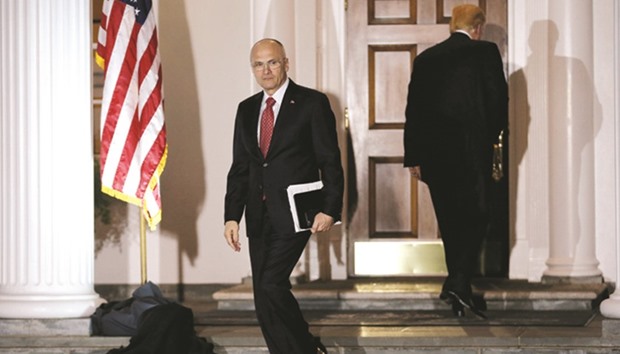President-elect Donald Trump will name fast-food executive Andy Puzder to head the US Department of Labour, according to a source familiar with the matter, in an appointment likely to antagonise organised labour.
Puzder, chief executive of CKE Restaurants, which operates the Carl’s Jr and Hardee’s fast-food chains, has been a vociferous critic of government regulation of the workplace.
He frequently publishes commentary and gives television interviews in which he argues that higher minimum wages would hurt workers by forcing restaurants to close, and praises the benefits of automation in the fast-food industry.
Fast-food workers, who are largely not unionised, are engaged in a multi-year campaign known as the “Fight for $15”, which is supported by labour unions, to raise minimum wages to $15 per hour.
They have had state-wide successes in New York and California and in cities and municipalities such as Seattle.
The selection of Puzder, first reported by the Wall Street Journal, was expected to be announced soon, the source said.
The Labour Department regulates wages, safety and discrimination in the workplace.
Trump transition spokesman Jason Miller, when asked on a daily briefing call about Puzder, did not address him directly but said there would be “additional cabinet information” released later in the day.
Puzder did not respond to requests seeking comment.
Republican Trump beat Democrat Hillary Clinton in last month’s election by carrying swing states – and some traditionally Democratic states – in the US Rust Belt after promising to create jobs and to review or cancel trade deals that he said were bad for workers.
During the election campaign, national labour leaders had urged their rank-and-file members to back Clinton, saying that Trump’s appointments and policies would not align with his promises to workers.
Although just 11.1% of US workers were represented by a union in 2015 – down from 20.1% in 1983, the first year government statistics were kept – labour unions are a powerful force in Democratic politics.
But union members’ support for Clinton was lower than it had been for President Barack Obama four years ago.
About 51% of voters from union households backed Clinton, with 42% supporting Trump, a CNN exit poll showed.
Obama won 58% of the same voters in his 2012 re-election win against Republican Mitt Romney, who garnered support from roughly 40%, according to exit polls.
Labour leaders have been girding for Trump to appoint pro-business regulators at the Labour Department and National Labour Relations Board, and to roll back key regulatory initiatives of the Obama administration such as a Labour Department rule granting overtime pay to more than 4mn salaried workers, both unionised and not unionised.
Lawrence Mishel, president of the left-leaning Economic Policy Institute, said Trump’s promises to workers are “at stake” if he names Puzder to head the Labour Department.
“Andrew Puzder has vocally opposed the Affordable Care Act, raising the minimum wage, and President Obama’s overtime rule – three policies that are central to an agenda of raising wages and combating inequality,” Mishel said in a statement.
Robert Cresanti, president of the International Franchise Association, an industry group, praised Puzder in a statement as an “exceptional choice” who would bring “business experience and policy acumen on so many issues impacting employers and employees”.
Trump’s decision to pick Puzder comes as he is engaged in a Twitter dispute with the head of a local United Steelworkers union in Indiana.
United Steelworkers Local 1999 president Chuck Jones, who represents workers at United Technologies Corp’s Carrier plant in Indianapolis, criticised Trump for inflating the number of jobs that would be saved by his intervention in the company’s decision to move some production to Mexico.
Trump responded on Twitter that Jones has done a “terrible job representing workers”.
Jones said after speaking to the company that 800 jobs will remain in Indianapolis and 730 of those will be union jobs, with another 70 management positions.
But Trump said last week that a deal made by Indiana to give the company $7mn in tax breaks would keep 1,100 jobs in the region.

This November 19 picture shows Puzder leaving after meeting President-elect Trump (right) at the main clubhouse at Trump National Golf Club in Bedminster, New Jersey.
